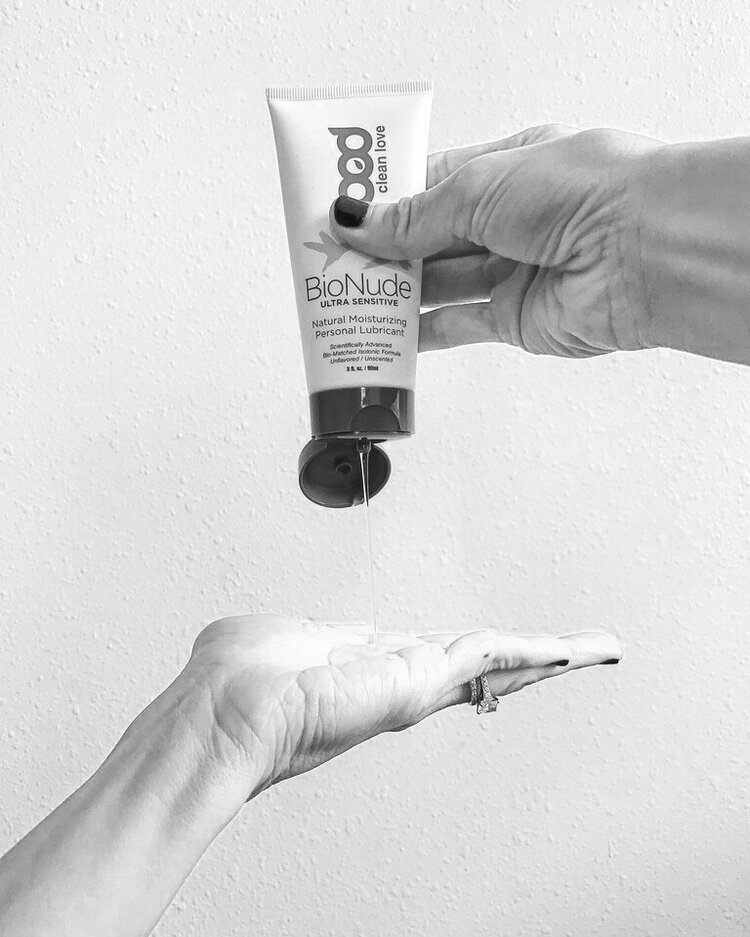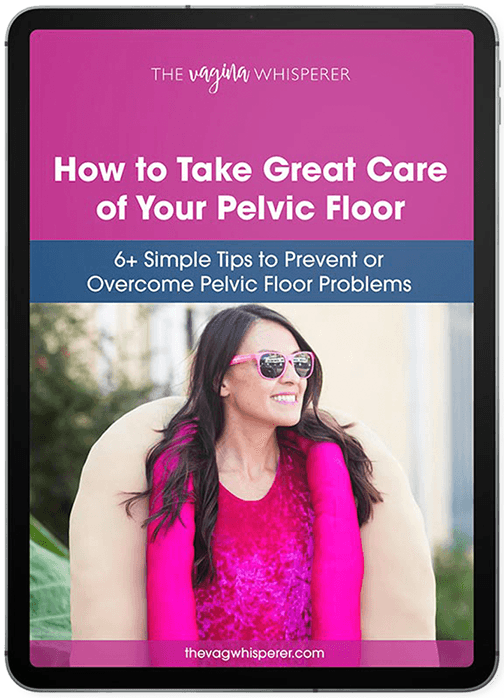Lube can be a great addition to sex for pleasure, decrease duration, or aid in vaginal dryness. But how do you know which lubes are smart choices and which ones you should stay away from? In this blog post we break down things you should keep in mind when trying to choose the best lubes.
Why should I use lube?
There are many reasons why someone would want to use lubricant during intercourse.
Hormone fluctuations during pregnancy, after delivery, and while pumping or breastfeeding can make things a little drier, even if you are mentally and emotionally ready to go. (Although vaginal dryness is very common, pain with intercourse is not and could be a sign that you would benefit from an evaluation by a pelvic floor PT).
Hormone fluctuations during menopause can make things a little drier as well. Vaginal dryness can occur for a number of reasons, including the aforementioned. Using a lubricant can also reduce tissue irritation and tearing. It can also just make sex more pleasurable.
With breastfeeding specifically, your prolactin levels must remain high which causes estrogen levels to remain low and therefore may result in vaginal dryness. Low estrogen levels are also associated with childbirth, menopause, autoimmune disorders and cancer treatments.
If you are dry down there, remember to stay well hydrated to keep all your tissues lubricated and encourage optimal blood flow. This will also help you feel better in general. You should also avoid harmful substances (like cigarettes and excessive alcohol) and exercise regularly as able.
How do I know which kind to use?
There are so many different choices when it comes to choosing a lubricant. It can be hard to know which one will work for your needs! Not all lubes are created equal, so don’t be afraid to try multiple types to find what works best for you. Keep reading to find out which ones I personally recommend.
Who would benefit from using lubricant?
- Those going through menopause
- Those looking to have anal sex
- Postpartum women who experience vaginal dryness (or anyone who experiences vaginal dryness)
- Those who have vulvodynia (chronic burning pain around the vagina)
- To assist with the use of toys and dilators during intercourse
- Those who are going through cancer treatments
- Those who feel it would make sex more pleasurable!
- Those who want to increase duration
- Those who have autoimmune disorders
Can I use lube when TTC?
If you are trying to conceive (congratulations!), it might be a good idea to stay away from the lube. This is because several studies have indicated that using lube can prevent the sperm from swimming to the egg. The more sperm that reach the egg, the more chances for fertilization. So, if you can, avoid lubrication while trying to conceive. Odds are, you’ll up your chances.
If you have any questions, don’t hesitate to ask your OBGYN, midwife or other medical provider about what’s safe and what isn’t. (Shameless plug! Help prepare your body for pregnancy, delivery and postpartum by becoming a member of the V-hive!)
How does lube come into play with certain cancers?
Individuals going through cancer treatments may need lube. The side effects for breast cancer and other cancer treatments from hormone therapy can result in many pelvic floor issues including incontinence, vaginal dryness, constipation and painful intercourse.
What should I look for in a lubricant?
I recommend using vitamin E oil or coconut oil daily to help hydrate and using a water based lubricant during intercourse. If you opt to use coconut oil or any oil-based lubricant for intercourse, condoms are at a risk of tearing and can be ineffective.
You want a lubricant that is specifically formulated to match the pH of your vagina to eliminate irritation during or after sex. Also, please choose a lube that is condom safe.
What should I avoid in a lubricant?
Lube products should be paraben, glycerin, petroleum and fragrance free, pH balanced, come with low osmolality, and should not cause burning or discomfort. There is no real benefit to buying a lube that is flavored so you should avoid those as well.
If you must get a lube that has a flavor, I recommend ones that use natural and organic flavors such as lemon and vanilla only. Anything that glitters, sparkles, tingles or smells should not go on your vagina!
The different types of tube
There are many different types of lubricants and if you don’t know where to start, it can be overwhelming. Lubricants may be water based, silicone based, aloe based, oil based or CBD based. Let’s break those down and discuss some pros and cons of each.
- Water based:
- Pros: Water based lube is great as they are typically gentle enough for sensitive skin and they won’t break down latex condoms or silicone toys.
- Cons: They do tend to dry up, so you may need to reapply more frequently than other options.
- Silicone:
- Pros: Last the longest, so you don’t have to reapply as often.
- Cons: They do tend to break down silicone toys and because they are good at their job, some may be harder to clean up afterwards. Silicone is a synthetic ingredient, so if you are trying to avoid certain products, keep this in mind.
- Aloe:
- Pros: Aloe based lubes are great options as they won’t break down latex condoms and silicone toys. They last longer than water based lubes and aloe is known to have soothing benefits for the skin.
- Cons: Some people may have a reaction to aloe. Be aware of any redness, burning, or stinging that may occur. You can test aloe lube on the inside of your elbow for a few hours before putting it below the belt.
- Oil:
- Pros: Oil based lubes last longer than many other types and are great for daily use for hydration.
- Cons: Some people do experience infections after using. Oil can also breakdown and rip condoms so keep that in mind.
- CBD lube (also CBD suppositories)
- Pros: These are great if you have pelvic floor overactivity. CBD works directly with the pelvic floor muscles and tissues to help them relax while providing the moisture needed from lube.
- Cons: At this time, CBD isn’t well regulated, so you will want to be sure your CBD is coming from a reputable source. The majority of CBD lubes do contain oil, so you will want to be aware if you are using condoms.
Which lubricants do you recommend?
Now let’s break down which ones I personally love and recommend myself.
- Best Lube – Water Based: Slippery Stuff lubricant is one we use in the clinic that is a water soluble lubricant, has minimal ingredients, is odorless and is available on Amazon. It’s one of our favorites!
- Runner up: Ah! Yes Water Based Organic Lubricant. This one is also made from organic aloe vera, plus organic flax, among other ingredients. It also has citric acid to help balance pH and is hypoallergenic.
- Best Lube – Aloe Based: Maude Shine Organic is a naturally hydrating, aloe-based lube. It is organic, pH-balanced and free from parabens and glycerin. The product markets itself as safe to use when TTC but always ask your provider first.
- Best Lube – Aloe/Water Hybrid: Good Clean Love Almost Naked – Good Clean Love’s products are made with organic ingredients. This one is also a water- aloe hybrid and is pH-balanced. It’s made with aloe vera, lemon and vanilla.
- Runner Up: Sliquid Organic Lubricating Gel. Like the others, this product is also aloe vera based and water soluble. It is 100% vegan friendly and 95% organic. It’s nontoxic, hypoallergenic and pH balanced.
- Best Lube – Silicone: Uberlube – Low on ingredients, this lube has added vitamin E for extra skin smoothing properties. It’s also condom friendly, water friendly, and it dissipates after use, leaving clean up a breeze.
- Best Lube – CBD: KUSH Queen Water Based CBD Lube. We chose this lube as it’s one of the few water based CBD lubes, making it compatible with condoms and toys. It’s also gentle on sensitive skin.
- Bonus: Foria Awaken Arousal Oil with CBD. Use this oil before sex. It is oil based so it’s not compatible with condoms. We love it because it “enhances tactile sensation & pleasure while decreasing tension, discomfort and dryness.” Foria also has some great CBD suppositories, and other products that can help with pelvic pain or discomfort. Check them out over on foriawellness.com.
Find what works for you!
If you take away anything from this blog post, remember to stay away from anything that tingles, sparkles, or has pesky ingredients like glycerin and petroleum. Your lube should be fragrance free. During intercourse, any “extras” that may be used such as condoms or toys should be fragrance free as well.
No matter which product you choose, all of the above are great. If you try them and for whatever reason, they don’t work for you, or you’re experiencing pain with sex, consult with your doctor and a pelvic health physical therapist.
Pain with sex is very common, but it is not normal. If you have pain with sex for any reason, please reach out to your trusted healthcare provider. If your provider dismisses your symptoms or concerns, know you always have the authority to seek out a second, third or even fourth opinion. Vaginal dryness is very common. Pain with sex is also common, but not normal and should be addressed so you can have a healthy and enjoyable sex life!
Some links may be affiliate links. The products we recommend are products we use or recommend to clients.





